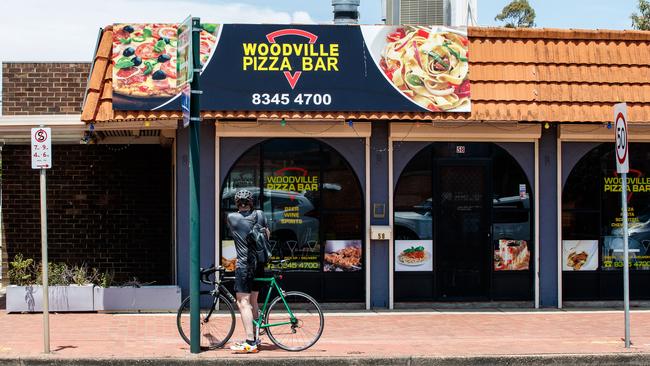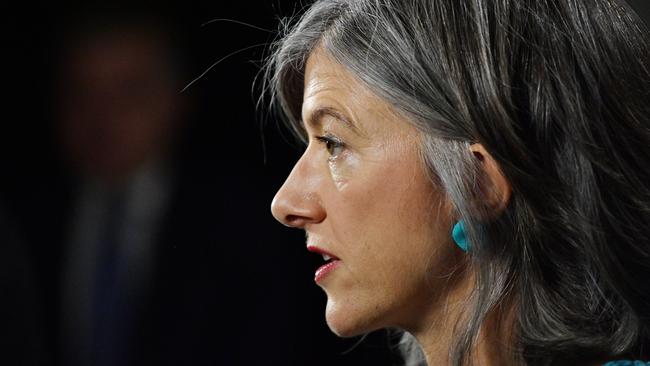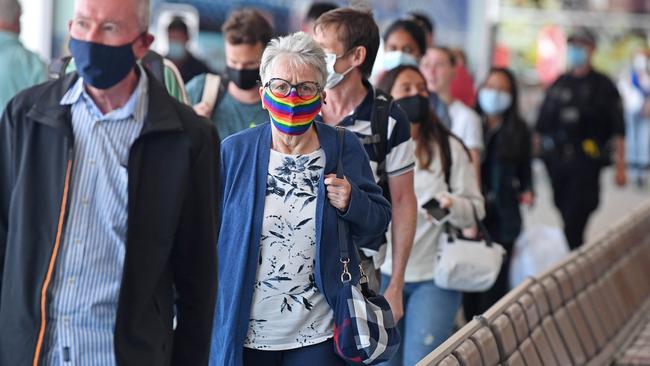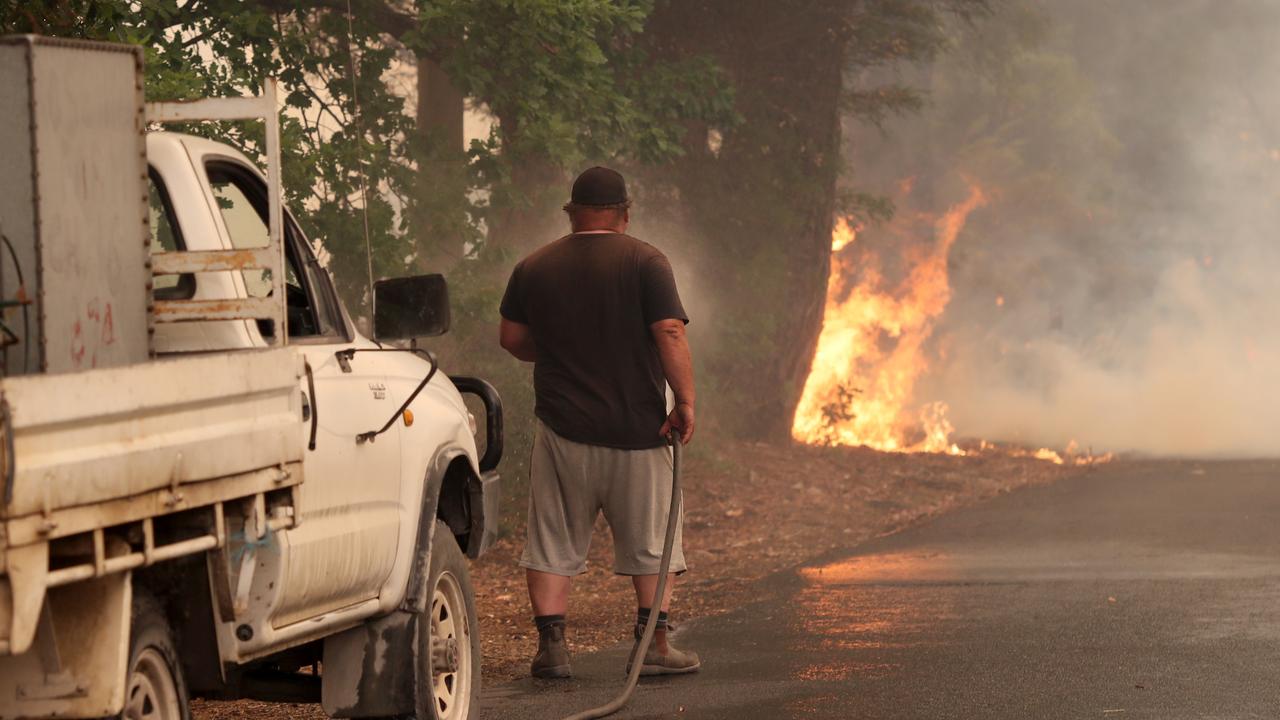Professor Nicola Spurrier wants QR codes to stay, expects climate change to fuel more pandemics
SA should keep using QR code check-ins, Nicola Spurrier says, as she called for stricter exemption rules.

Coronavirus
Don't miss out on the headlines from Coronavirus. Followed categories will be added to My News.
QR codes should stay in South Australia – even after the coronavirus pandemic eases – to help authorities contain future disease outbreaks, the state’s health chief says.
In a wide-ranging interview on the anniversary eve of SA’s first two coronavirus cases, chief public health officer Nicola Spurrier has emphasised the importance of the scanning technology in cutting contact tracing from weeks to just hours when an infectious case is identified.
It comes as SA recorded one new case on Sunday, a man in his 40s who contracted the disease overseas and is in a medi-hotel.
In the past year, SA has had – and contained – six significant clusters, multiple border rule changes, restrictions, lockdowns, mandatory quarantine for overseas arrivals, medi-hotels and changes to everyday life ranging from social distancing to limits on house parties. Professor Spurrier said she was positive about the coming year but warned Australia could expect more pandemics likely sooner than the 100-year gap since the Spanish flu.
She said she would like QR codes to stay as a contact tracing safety net after the coronavirus pandemic has eased.
“You can imagine if, and when, COVID resolves, it would be hard to convince people to have the energy to keep scanning in but certainly it is a total game changer for our contact tracers,” Prof Spurrier told the Sunday Mail.
She said SA Health’s Communicable Disease Control Branch contact tracers were able to access a database and identify other people who had scanned entry to a venue where a positive case was identified.

She said the system had the ability to send a text message notifying a close contact before contact tracers had a chance to make a phone call.
“We have this ability to very quickly message people which would have taken days, if not weeks, previously,” Prof Spurrier said. She said Australians could expect more pandemics driven by humans.
“The way humans have impacted on the natural environment in terms of flora and fauna sets up the right environment for pandemics,” Prof Spurrier said.
“With climate change, we expect to see different infections coming to different parts of the world.
“As the climate changes and animals, plants and insects try to adapt to those changes, we will see more infectious disease. The thing about pandemics is they are completely unpredictable.”
Prof Spurrier also:
CALLED for stricter rules on who is given exemptions to travel overseas and return, possibly with the virus, noting SA officials had no say in the process;
WARNED that restrictions, including on international air travel, may have to stay in place for a long time as the new vaccines may not stop transmission of the disease;
PREDICTED the vaccines “will save lives” by reducing the severity of the coronavirus, particularly among the elderly, and urged the public to “put out your arm”;
SAID that, in retrospect, some of the initial restrictions could have been eased earlier but stressed “we didn’t have the experience with the virus that we had later on”.
NOTED the pandemic had several “silver linings”, including creating an urgency which had overcome the usual public service red tape, notably in implementing widespread telemedicine consultations billed to Medicare, hospital-at-home care programs and the IT needed to run the QR code scanning system, and;
PRAISED SA’s “Goldilocks” status – not too big, not too small, but just right – as a secret weapon in its success fighting the pandemic.

WHAT ARE THE MAIN LESSONS LEARNT?
“Working in public health health for a long time, I understood the importance of partnerships,” Professor Nicola Spurrier said.
“When treating individuals, it is just you and the patient but when we do public health and are treating the whole population as a patient, the only way to improve health is by working with other people.
“Being small in South Australia, where lots of us know many other people, that sort of networking was absolutely crucial.
“That’s one of the silver linings of the pandemic – those relations are even more solid and we have a lot of relationships with the private sector.”
REGRETS, DO YOU HAVE A FEW?
“I have to honestly say I don’t have any. The thing is again being a small state, we have an ability to get information quickly, we know who to speak to, to get the information.
“Even dealing with the other states, because I have strong relationships with the other chief health officers and their staff, we can get information really quickly, which helps with planning. You can’t be making decisions without the right information.”
She concedes officials possibly could have lifted those early restrictions a little faster “but again, we didn’t have the experience with the virus that we had later on”.
WHAT IS THE OUTLOOK FOR THIS YEAR – WILL IT ALL BE BEHIND US BY CHRISTMAS?
“Nobody knows, but as humans, we are very intelligent, we have made some amazing innovations in 2020 and I am sure the same thing will happen this year, ”she said.
“The fact we have not just two successful vaccines but a significant number of potentially successful vaccines in such a short period of time is really a testament to the research and development of the scientific community around the world.
“I am always very positive about things. We have done extremely well in Australia when you look at what’s happened in other countries.”
Prof Spurrier said that as Australia vaccinated the population, it might not be 100 per cent successful in terms of efficacy but it would mean protection particularly for the most vulnerable such as the frail elderly.
“It will mean we have got that protection – the vaccine is definitely going to save us lives,” she said.
DO YOU EXPECT TO SEE THE RETURN OF ROUTINE INTERNATIONAL AIR TRAVEL THIS YEAR?
“It is very difficult to say when – it will be dependent on how the vaccine goes, because of the way the trials have been run the focus has been on decreasing the severity of the disease,” she said.
“We know the vaccines will save lives because they will reduce severity.”
But Prof Spurrier said the trials had not given the information so far on whether the vaccines stop transmission. This left open the possibility that vaccinated people might get the disease with few if any symptoms, but still be able to pass it on to others.
“One would think it would reduce the transmission of the disease but we don’t know for sure so people might have a milder disease but still be able to pass it on,” she said.
“Then we would need to have some levels of restrictions in place, so it is just too early to tell. But the more Australians who put out their arm and get that vaccine, the better.”

IS THIS OUR LAST PANDEMIC?
“No,” she said. “Pandemics have been with human civilisation for a long time, and if you think about how the world functions now compared to 100, 200 years ago, there is obviously a lot more travel.
“Even 30 years ago, we were not travelling as much as we do currently, and viruses and bacteria spread from human to human. And they like travelling; they like it when people get on board planes and sit close to each other and rebreathe air because it means they can get transmitted.”
HAVE YOU BEEN SURPRISED BY THE LEVEL OF PUBLIC COMPLIANCE?
“I’m really confident in South Australians – we have pretty law-abiding, pretty sensible people here and we also look after each other. It’s been the same with other disasters such as bushfires, where people rally around communities and everyone wants to help out.
“So in a sense, I was not surprised because I’m a South Australian and I feel the warmth of other South Australians. I do feel we will look after each other.”
WHAT HAS SURPRISED YOU IN THE PAST 12 MONTHS?
“The speed at which we have been able to achieve things.
“Working as a public servant, there is obviously red tape and normal bureaucracy but when we had the pandemic, we have been able to get things done that we haven’t been able to do previously – these are some of the silver linings.”
WHAT IS YOUR RESPONSE TO PEOPLE WHO SAY WE KEEP HAVING COVID FLOWN IN AND SO WE SHOULD STOP ALL THE PLANES, AT LEAST IN THE SHORT TERM?
“That is absolutely our major risk and been the reason why we have had these outbreaks in Australia,” she said. “I’ve been very keen with the other chief health officers to look at ways we can make it safer.”
Prof Spurrier called for tighter controls on approvals for who can fly into Australia, while noting a national responsibility to help citizens come home.
YOUR MESSAGE TO THE PUBLIC AFTER ONE YEAR OF COVID IN SA?
“Just keep being positive. We are very lucky here in South Australia and there are only a few small things we need to remember to do.”
These included getting a test when sick, not going out when sick, washing hands and using hand sanitiser, maintaining the social-distancing space, using the QR readers, and if going into a crowd where spacing is not easy, keeping a mask handy and using it, she said.
“And stop shaking hands,” Prof Spurrier said. “I know guys like to shake hands but those sorts of things, unless you are going to pull out your hand sanitiser straight afterwards, go back to the ‘elbow-touch’ or a wave.”





